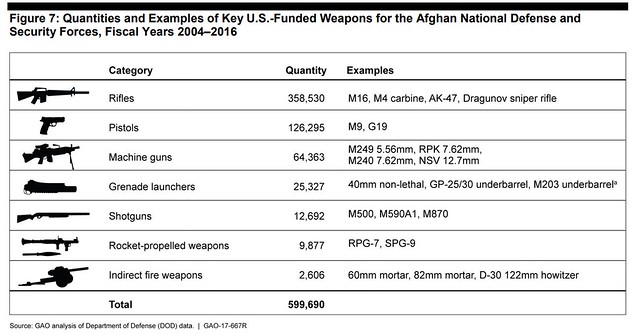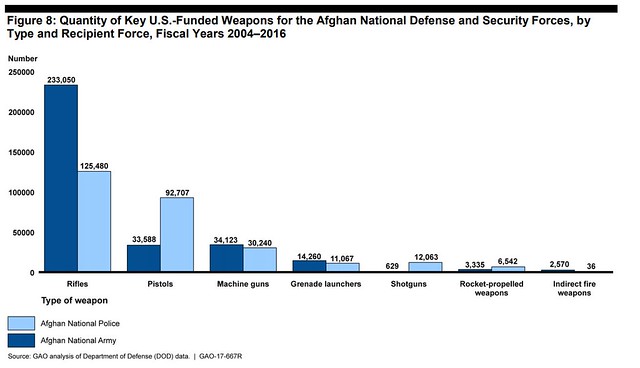Very interesting that we supplied RPG-7, 82mm mortars and D-30 122mm howitzers. None of those are US weapons and all are Soviet/ old Warsaw Pact designed weapons.
Also note that the AK-47, Dragunov sniper rifle, RPK 7.62mm and NSV 12.7mm machine guns are on the list, as well.
So are we paying someone else to actually make non-US weapons to give to Afghanistan?
I doubt it, but stranger things have happened. I don't think we have gone to any of the AK factories and placed orders for new made AKs so we could give them to the Afghans.
There are three schools of thought when it comes to arming the "security forces" of nations we are
rebuilding.
One is, that we shouldn't. That we should provide the needed security, until local forces are both trained and equipped by local resources. This school seems to currently be the minority opinion.
Another is that we should arm them with US weapons (only) thus "promoting a closer relationship with " (aka dependency on) the US.
The other school of thought, currently in the ascendency, is that we should provide only enough US weapons for immediate short term needs, and provide non-US weapons (Combloc designs, primarily) for the long term and bulk of local forces.
There is some sound reasoning behind this school of thought. One of them is actually the sound of the weapons!!!
#1, the Afghans fought the Soviets for many years, so soviet weaponry, and ammo stocks are already widely used in country (by the other side, primarily). If "loyal" forces are supplied with the same weaponry, anything captured will be of use.
#2, since Combloc weapons have been in use for decades, some level of familiarity is already established and therefore training time & costs are reduced, compared to a totally different set of designs (US weapons).
#3, tactical, if they use the same weapons as the other side, security forces cannot be identified by sound, alone. This may seem like a small matter, but it becomes a large one for the people on the sharp end. Yes, it is a two edged sword, meaning that it can be used by both sides, but the one thing it does for us, is to deny then enemy the ability to identify our side by sound alone.
When one side's weapons sound distinctly different from the other, the guys pulling triggers can hear it, and will know if those shots from the next block come from enemy weapons, or not. When all the rifles sound the same, this advantage goes away, and the uncertainly CAN be a tactical advantage. (can be, not "is"

)
Next point, something not addressed in the GOA tables given here, is how many (what percent) of non-US weapons we supplied came from captured stocks?? How many, if any, were purchased on the world market, to make up the difference??
Yet another point, and one outside the scope of the GAO report is what, if anything did, or will the Afghans pay for what we "give" them. Good will, now, (from SOME of them) and a promise of actual payment later??? Some kind of actual payment now?? I don't know, and tis the kind of thing that even if it happens (and we do get paid back some) its not over reported.
The US has a long history of buying good will (and at least temporary peace) by pouring our money down the rathole. This is justified by saying it's cheaper than blood. and it is., and usually works, to a degree. It makes some of the rats very happy (until it stops, at which time they go right back to hating us), and ticks off the rats who aren't getting a cut.
has the aid to the "sandbox" been mis-managed? Have we lined the pockets of numerous indviduals, and paid well over market rate for what we got? Absolutely. Was/will it all have been for naught in the log run, I think mostly yes, but only time will tell.




